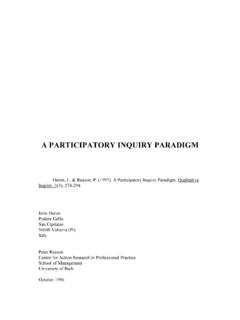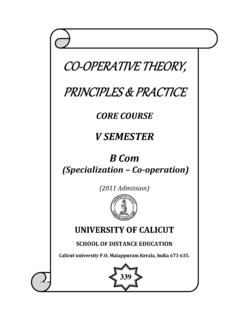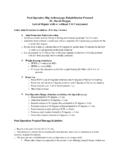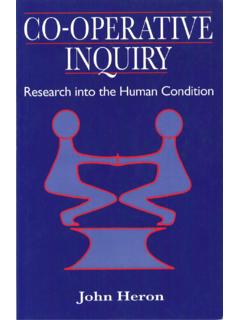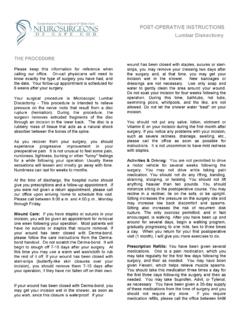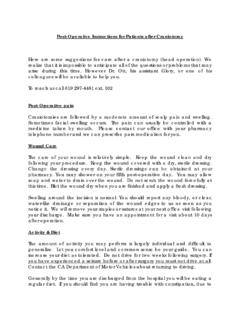Transcription of CHAPTER 16 THE PRACTICE OF CO-OPERATIVE …
1 CHAPTER 16 THE PRACTICE OF CO-OPERATIVE inquiry : research with rather THAN ON PEOPLEi John Heron and Peter Reason CO-OPERATIVE inquiry is a way of working with other people who have similar concerns and interests to yourself, in order to: Understand your world, make sense of your life and develop new and creative ways of looking at things. Learn how to act to change things you may want to change and find out how to do things betterii. research is usually thought of as something done by people in universities and research institutes. There is a researcher who has all the ideas, and who then studies other people by observing them, asking them questions, or by designing experiments. The trouble with this kind of way of doing research is that there is often very little connection between the researcher's thinking and the concerns and experiences of the people who are actually involved. People are treated as passive subjects rather than as active agents.
2 We believe that good research is research conducted with people rather than on people. We believe that ordinary people are quite capable of developing their own ideas and can work together in a CO-OPERATIVE inquiry group to see if these ideas make sense of their world and work in PRACTICE . The PRACTICE of CO-OPERATIVE inquiry 2 A second problem with traditional research is that the kind of thinking done by researchers is often theoretical rather than practical. It doesn't help people find how to act to change things in their lives. We believe that the outcome of good research is not just books and academic papers, but is also the creative action of people to address matters that are important to them. Of course, it is concerned too with revisioning our understanding of our world, as well as transforming PRACTICE within it. So in traditional research on people, the roles of researcher and subject are mutually exclusive: the researcher only contributes the thinking that goes into the project, and the subjects only contribute the action to be studied.
3 In CO-OPERATIVE inquiry these exclusive roles are replaced by a CO-OPERATIVE relationship, so that all those involved work together as co-researchers and as co-subjects. Everyone is involved in the design and management of the inquiry ; everyone gets into the experience and action that is being explored; everyone is involved in making sense and drawing conclusions; thus everyone involved can take initiative and exert influence on the process. This, as we have said, is not research on people or about people, but research with people. We summarize the defining features of CO-OPERATIVE inquiry on which we elaborate as the CHAPTER proceeds as follows: All the active subjects are fully involved as co-researchers in all research decisions - about both content and method - taken in the reflection phases. There is intentional interplay between reflection and making sense on the one hand, and experience and action on the other There is explicit attention, through agreed procedures, to the validity of the inquiry and its findings.
4 The primary procedure is to use inquiry cycles, moving several times between reflection and action. The PRACTICE of CO-OPERATIVE inquiry 3 There is a radical epistemology for a wide-ranging inquiry method that integrates experiential knowing through meeting and encounter, presentational knowing through the use of aesthetic, expressive forms, propositional knowing through words and concepts, and practical knowing how in the exercise of diverse skills intrapsychic, interpersonal, political, transpersonal and so on. These forms of knowing are brought to bear upon each other, through the use of inquiry cycles, to enhance their mutual congruence, both within each inquirer and the inquiry group as a whole. There are, as well as validity procedures, a range of special skills suited to such all-purpose experiential inquiry . They include fine-tuned discrimination in perceiving, in acting and in remembering both of these; bracketing off and reframing launching concepts; and emotional competence, including the ability to manage effectively anxiety stirred up by the inquiry process.
5 The inquiry method can be both informative about, and transformative, of any aspect of the human condition that is accessible to a transparent body-mind, that is, one that has an open, unbound awareness. Primacy is given to transformative inquiries that involve action, where people change their way of being and doing and relating in their world in the direction of greater flourishing. This is on the grounds that practical knowing-how consummates the other three forms of knowing propositional, presentational and experiential on which it is grounded. The full range of human capacities and sensibilities is available as an instrument of inquiry . A CO-OPERATIVE inquiry cycles through four phases of reflection and action. In Phase 1, a group of co-researchers come together to explore an agreed area of human activity. They may be professionals who wish to inquire into a particular area of PRACTICE ; couples or families who wish to explore new styles of life; people who wish to practise in depth transformations of being; The PRACTICE of CO-OPERATIVE inquiry 4 members of an organization who want to research restructuring it; ill people who want to assess the impact of particular healing practices ; and so on.
6 In the first part of Phase 1, they agree on the focus of their inquiry , and develop together a set of questions or propositions they wish to investigate. Then they plan a method for exploring this focal idea in action, through practical experience. Finally, in Phase 1, they devise and agree a set of procedures for gathering and recording data from this experience: diaries, self-assessment rating scales, audio or video recordings, feedback from colleagues or clients, etc. For example, a group of health visitors in south west England were invited by one of their colleagues to form an inquiry group to explore the sources of stress in their work (Traylen, 1994). After some resistance to the idea that they could be researchers , the group decided to explore the stress that comes from the hidden agendas in their work the suspicions they had about problems such as depression, child abuse, and drug taking in the families they visit which are unexpressed and unexplored.
7 In Phase 2 the co-researchers now also become co-subjects: they engage in the actions they have agreed; and observe and record the process and outcomes of their own and each other's action and experience. They may at first simply watch what it is that happens to them so they develop a better understanding of their experience; later they may start trying out new forms of action. In particular, they are careful to notice the subtleties of experience, to hold lightly the conceptual frame from which they started so that they are able to see how PRACTICE does and does not conform to their original ideas. The health visitors first explored among themselves their feelings about their hidden agendas and how they were managing them at that time. They then decided to experiment with confronting them. Through role play, they practised the skills they thought they would need, and then agreed to try raising their concerns directly with their client families.
8 The PRACTICE of CO-OPERATIVE inquiry 5 Phase 3 is in some ways the touchstone of the inquiry method. It is a stage in which the co-subjects become full immersed in and engaged with their action and experience. They may develop a degree of openness to what is going on so free of preconceptions that they see it in a new way. They may deepen into the experience so that superficial understandings are elaborated and developed. Or their experience may lead them away from the original ideas into new fields, unpredicted action and creative insights. It is also possible that they may get so involved in what they are doing that they lose the awareness that they are part of an inquiry group: there may be a practical crisis, they may become enthralled, they may simply forget. It is this deep experiential engagement, which informs any practical skills or new understandings which grow out of the inquiry , that makes CO-OPERATIVE inquiry so very different from conventional research .
9 The health visitors' experience of trying out new ways of working with clients was both terrifying and liberating in ways none of them had expected. On the one hand they felt they were really doing their job; on the other hand they were concerned about the depth of the problems they would uncover and whether they had adequate skills to cope with them. In particular, the woman who had initiated the project in particular was anxious and had disturbing dreams. The group members found they had to keep in good contact with each other to provide support and reassurance as they tried out new behaviours. In Phase 4, after an agreed period in Phases 2 and 3, the co-researchers re-assemble to share in both presentational and propositional forms their practical and experiential data, and to consider their original ideas in the light of it. As a result they may develop or reframe these ideas; or reject them and pose new questions. They may choose, for the next cycle of action, to focus on the same or on different aspects of the overall inquiry .
10 The group may also choose to amend or develop its inquiry procedures forms of action, ways of gathering data in the light of experience. The PRACTICE of CO-OPERATIVE inquiry 6 The health visitors came back together and shared their experience, helping each other understand what had taken place and developing their strategies and skills at confronting hidden agendas. After several cycles they reflected on what they had learned and wrote a report which they circulated to their managers and colleagues. So the cycle between reflection and action is repeated several times. Six to ten cycles may take place over a short workshop, or may extend over a year or more, depending on the kind of questions that are being explored. These cycles ideally balance divergence over several aspects of the inquiry topic, with convergence on specific aspects, so that there is a refined grasp of both the whole and its parts. Experiential competencies are realized; presentational insights gained; ideas and discoveries tentatively reached in early phases can be checked and developed; skills are acquired and monitored; investigation of one aspect of the inquiry can be related to exploration of other parts; the group itself becomes more cohesive and self-critical, more skilled in its work.

